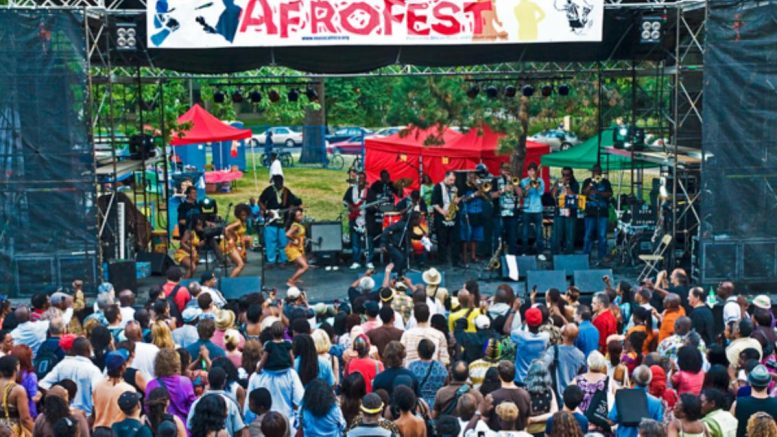Authentic foods, arts, crafts and music from across the continent highlight event, now celebrating 25th year.
Nick Krewen
Music,
Published on Fri Jul 05 2013
It was as good an omen as any.
Michael Stohr recalls that 25 years ago at Queen’s Park during the debut of Afrofest, a downpour threatened to dampen the celebrations of those attendees waiting patiently for South African trumpet superstar Hugh Masekela to take to the stage for his headlining set.
“At exactly the time he started, the clouds parted, and the sun shone,” remembers Stohr, who has since become president of Music Africa, the non-profit organization runs the annual event, Toronto’s largest celebration of African culture.
“That was quite a remarkable birthing moment.”
With the exception of a few speed bumps along the way, Afrofest has enjoyed clear skies ever since, growing from a daylong event that initially attracted 2,000 people to one that has expanded into a two-day experience that, according to Stohr, now attracts 100,000 people over the weekend.
Featuring authentic African foods, arts and crafts from 70 vendors, as well as fun and educational activities for youth and kids, the free-admission festival will celebrate its quarter-century mark this weekend at Woodbine Park, with organizers hoping that those who attend the event depart with a better understanding of the world’s second largest continent; second in population with an estimated 1 billion people spread over 54 countries.
“We want to alter peoples’ perception of what Africa is and what it is to be African,” says Stohr, 58, born in Cape Town, South Africa and co-host of Karibuni, the weekly two-hour African music radio program heard Sundays on University of Toronto radio station CIUT 89.5.
“The absolute core of what we do is about highlighting the diversity, just having people understand that parts of Africa are just so different. It’s not one place.
“I think even Africans come and they get reminded, just by the colour and the diversity of food, the different clothing that people wear, and it shows people that it’s not an island, it’s not a country, it’s a massively diverse continent.”
Music, of course, plays an important part of the festivities, and this year’s Afrofest will feature two stages of international and local musical acts, ranging from politically charged Ivory Coast reggae superstar Alpha Blondy and his Solar System to local Ghana Highlife import Jewel Ackah.
“We wanted to have a really well known artist with broad appeal, and the fact that it’s a reggae band is part of our theme of inclusiveness, in that we celebrate the African diaspora as well as the African continent,” says Stohr of Blondy, who is being added to a list of Afrofest superstar headliners over the years that includes South Africa’s Hugh Masekela; Congo soukous musician Papa Wemba; Malian Wassoulou songbird Oumou Sangaré and Zimbabwe’s husky-voiced Oliver Mtukudzi, among others.
“So it’s not only about our diversity, but it also includes the diaspora and that I think is really reflected in our audience. We always recognize that in some way in our musical presentation.”
Stohr also points to the youth movement as a reason for steady expansion, and says the second stage of musicians, which this year ranges from Kenyan-born Sudanese spoken word artist Yusra Khogali and Somaliland, East African singer Hodan Hussein, reflects the new youth movement.
“Part of the growth has occurred because Afrofest has really caught on with African youth,” he explains. “And a lot of the growth in our crowd is a young African audience. The second stage is a really important space for African youth because it promotes a positive vision of Africa.”
Some of those speed bumps have included being kicked out of Queen’s Park, initially denied a permit in 2011 in part due to its sheer size, and being forced to find a new home at Woodbine Park in time for its 2012 program.
“Our biggest problem has been popularity,” says Stohr, who says this year’s Afrofest will conclude Sunday night with a collective prayer to health-challenged anti-apartheid icon and former South African president Nelson Mandela.
“Most of the challenges that we’ve faced have just been about the sheer growth of the festival and the crowds.
“We were the festival that outgrew Queen’s Park. We started out in one corner of the park, and we’re looking to keep growing and we think we will keep growing. And we may face those challenges in the future.
“But we’ve been very pleased that most of our audience has moved with us to Woodbine Park.”
http://www.thestar.com/entertainment/music/2013/07/05/how_afrofest_evolved_into_torontos_largest_celebration_of_african_culture.html


Be the first to comment on "How Afrofest evolved into Toronto’s largest celebration of African culture"